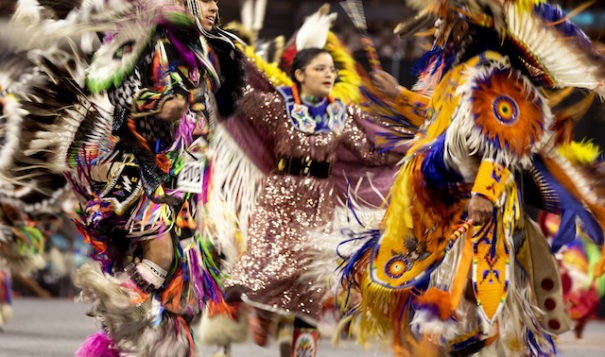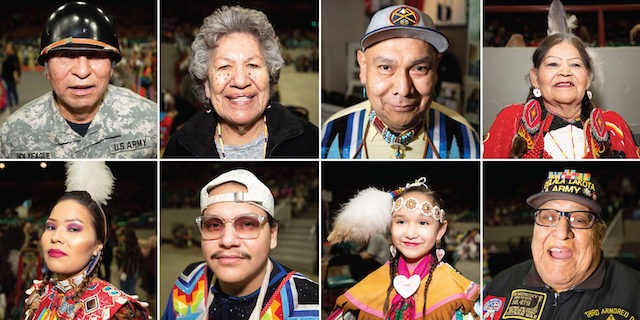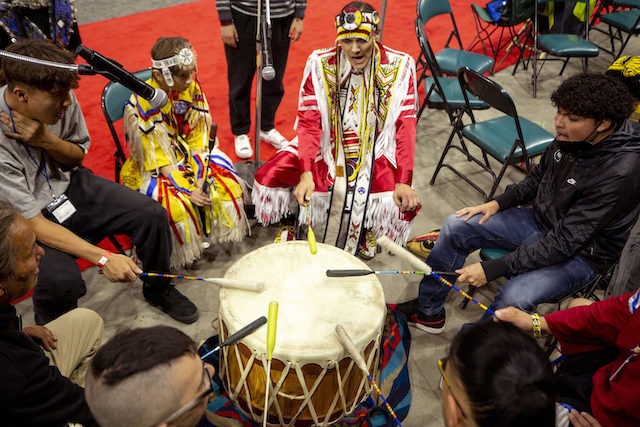News Based on facts, either observed and verified directly by the reporter, or reported and verified from knowledgeable sources.
We’re all back together – Denver March Powwow one of the countrys largest- returns after a pandemic hiatus
 A fancy dance kicks off programming for the Denver March Powwow at the Denver Coliseum. March 18, 2022.
A fancy dance kicks off programming for the Denver March Powwow at the Denver Coliseum. March 18, 2022.
Carol Melting Tallow can feel an invisible bubble form around her when she enters the Denver Coliseum arena to dance. As she begins her steps, the beat of the drum keeps her steady and the rest of the world falls away. The world champion women’s fancy shawl dancer calls it her sanctuary.
“I forget my stresses, my problems, my bills, the people who talk negative about me, my family problems. It all subsides for that one point, that one moment in time when I’m dancing,” she said.
Melting Tallow, a member of the Blood Tribe, traveled from her current home in Austin, Texas, with her son to compete on historical Cheyenne, Arapahoe and Ute land in the Denver March Powwow this weekend, along with more than 1,000 other dancers and dozens of drum groups from around North America. The event, one of largest powwows in the country, was back after a two year pandemic hiatus. And Melting Tallow, also known by her Indian name, Eagle Woman, was elated to see the familiar faces of her powwow family and dancing legends.
“Just to see their smile, just to see that they’re still living, that we survived this pandemic, that these elders that are 70-plus, that they didn’t get sick and they didn’t pass on. That is a blessing within itself, just to see them dance this afternoon,” she said.
Feelings like that were common on Friday, the opening day of what participants just call Denver March. As hundreds of dancers in a vast array of regalia flooded onto the floor for the Grand Entry to kick off the powwow, Melting Tallow kept hearing people around her express their gratitude that they had survived and made their way back.
Lawrence Baker, the powwow emcee and a member of the Mandan and Hidatsa tribes and the Rincon Band of Luiseño Indians, echoed this sentiment on the mic, telling the crowd his own personal experience with the virus.
“I got COVID. I lost 43 pounds. I lost two jean sizes. So, around July, I’m having a rummage sale for all those skinny jeans,” Baker joked, pulling in a small laugh from the audience. “I’m glad to see every one of you dancers in here. It makes me feel good. It’s good to see all of you. I love each and every one of you,” he continued.

COVID-19 has taken a disproportionately heavy toll on many Native American communities, and laid bare long-standing health inequities. However, once vaccines became available last year, many Native nations and health organizations led the way in vaccinating their members.
For many, including Baker, powwows are about community and family in the face of hardship. Baker, whose Indian names are Four Winds and Three Feathers, got his start as an emcee at Denver March more than 16 years ago. Powwow committee members over the years became family for Baker, who had lost his mother and father.
Denver March was inspired decades ago by those same principles of community and family, as well as cultural preservation, at a time when hundreds of thousands of Indigenous people were moving — and being moved — into cities.
In 1952, the Bureau of Indian Affairs started an initiative, dubbed the Voluntary Relocation Program, that offered benefits like moving expenses and financial and housing assistance to convince Indigenous people to leave reservations (where they were previously forcibly relocated) for cities around the country, like Denver.
Some families never saw the promised benefits., and the program, which ran until 1973, is seen by many as yet another government effort to erase Indigenous cultures and ways of life.
“A lot of Indians end up in Denver, and so [they are] a little bit lost culturally, not spiritually. They’re like, how do we bond together? So all of a sudden, they start meeting and they start gathering,” Baker said.
Eventually, after years of meals and other community events, the first version of Denver March was born.

“They host a little powwow to make themselves feel better about where they came from. Because you can’t just turn off who you are to become citizens of the United States because of the melting pot of the Americas and how it started,” Baker continued.
Now, Denver March is in its 46th year. In addition to the many dancers and drum groups, the gathering features storytellers passing on oral histories, arts and crafts vendors, plenty of food, and even a mobile COVID vaccination bus. The celebration continues through Sunday.
Over on the arena’s edge, Melting Tallow encouraged her son, Xavier Bolton, as she braided his hair and they watched dancers warm up.
“You might get a song like this. You gotta make it look good,” she said to her son, chuckling.
“I will. I’ll try,” Bolton replied to his mom.
“Dig deep, and find the soul and the heart of it,” Melting Tallow said, before going on to fasten otter fur to his braids. They jokingly called the pelts Fred and Larry.
For her, bestowing a legacy of dancing onto her son is what it’s all about. She wants him to know who he is and be proud of that.
“We live in 2022 and a lot of people think that we lost our way of life, but we haven’t. This is how you preserve it. And then, by preserving it, it’s showing your offspring the things that you were taught from your parents or your great-grandparents,” she said.
